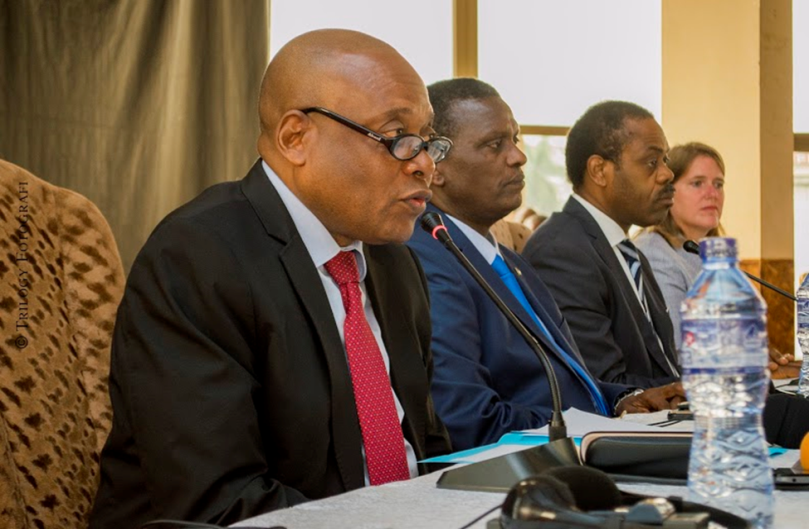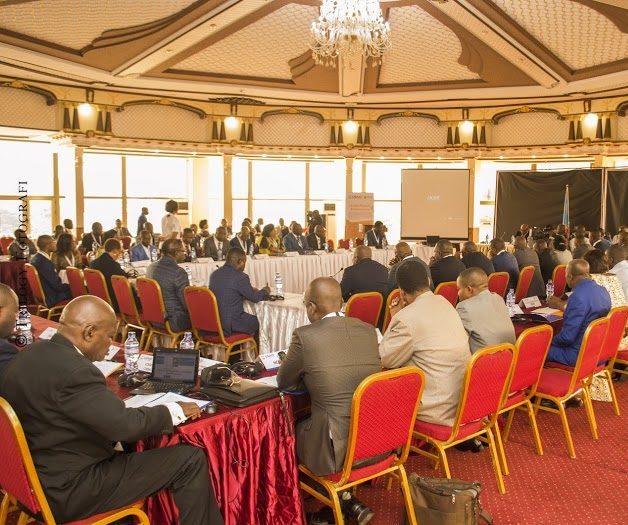Officials Gather in Kinshasa, DRC for Course on Health Sector Decentralization
Categories: Announcements, Home Page Map, Where We Work
In May, the HFG project supported the second “International Course on Decentralization in the Health Sector”, held in Kinshasa, Democratic Republic of the Congo (DRC). The five-day course was a follow up to the first decentralization course in May 2016. The course was so successful that participants asked that the HFG project consider organizing more courses on the topic. Both courses were designed to inform the ongoing decentralization process that was established as an objective in the country’s 2006 Constitution. The Constitution defined different roles for the national and provincial governments, supporting efforts to develop additional laws and regulations relating to decentralization in general and specifically to the health sector, as well as the future implementation process.

Opening Ceremony – From left to right: Mr. Steve Mbikay, Minister of Higher Education; Mr. Azarias Ruberwa, Minister of State and Decentralization; Dr. Oly Ilunga, Minister of Health; and Kendra Schoenholz, Deputy Mission Director, USAID/DRC.
The course encouraged a network of officials at the national and provincial levels to participate in the process for developing an appropriate policy for extending decentralization in order to improve the performance of the health sector in the DRC. The course was implemented under the auspices of KSPH to build the institution’s capacity to offer similar courses in the future. Dr. Tom Bossert from the Harvard School of Public Health provided expert assistance to KSPH in the planning and delivery of the course, with the HFG project providing overall organizational and logistical support.
While the 2016 iteration targeted central directors, heads of the provincial health divisions, and provincial medical inspectors; the second course brought together all 26 provincial ministers of health, 18 provincial medical inspectors who were unable to participate in the first course, 13 directors of specialized programs that will be integrated at the provincial level, four participants from the General Inspectorate of Health Inspectors, and 13 international partner participants.
This second iteration of the course on decentralization in the DRC’s health sector received even more interest than the first, as evidenced by the officials who formally opened the course: Mr. Azarias Ruberwa (Minister of State, Decentralization and Institutional Reforms), Dr. Oly Ilunga (Minister of Public Health), Mr. Steve Mbikay (Minister of Higher Education) and Kendra Schoenholz (Deputy Mission Director, USAID/DRC).

It focused on understanding and using the analytical framework of “decision space” to measure progress in implementing reforms in the context of decentralization, identification of challenges and obstacles in the implementation of decentralization laws and regulations, analysis of funding mechanisms, human resources management, capacity and accountability, and decentralization policies. Participants were given a systematic approach to analyze the decentralization process and to understand the challenges and their role to advance the process in their respective provinces. One participant noted: “The course let us acquire a clear vision on decentralization, to understand the magnitude of the challenges we are exposed to and their extreme importance, we have been familiarized to an easy framework (decision space) to measure where we stand with the decentralization process in regard of its different main functions and identify where we need to go.”
The course was highly successful and achieved the following:
- A common language and set of concepts about decentralization were developed that participants found useful.
- Five potential agendas for adopting and implementing greater decentralization were developed by the participants.
- A general consensus among the participants appeared to form around the need to use as much of the current “decision space” at the provincial level as possible, the need to better coordinate with central authorities, and the need to coordinate among provinces to push an agenda for implementing greater decentralization. One participant noted:
- The KSPH management of the course and the teaching by faculty show that the school now has the ability to sustain the course in the future. One participant said he was glad to see KSPH leading the course and that he “hope[d] that the KSPH will continue its implementation of the course.”



